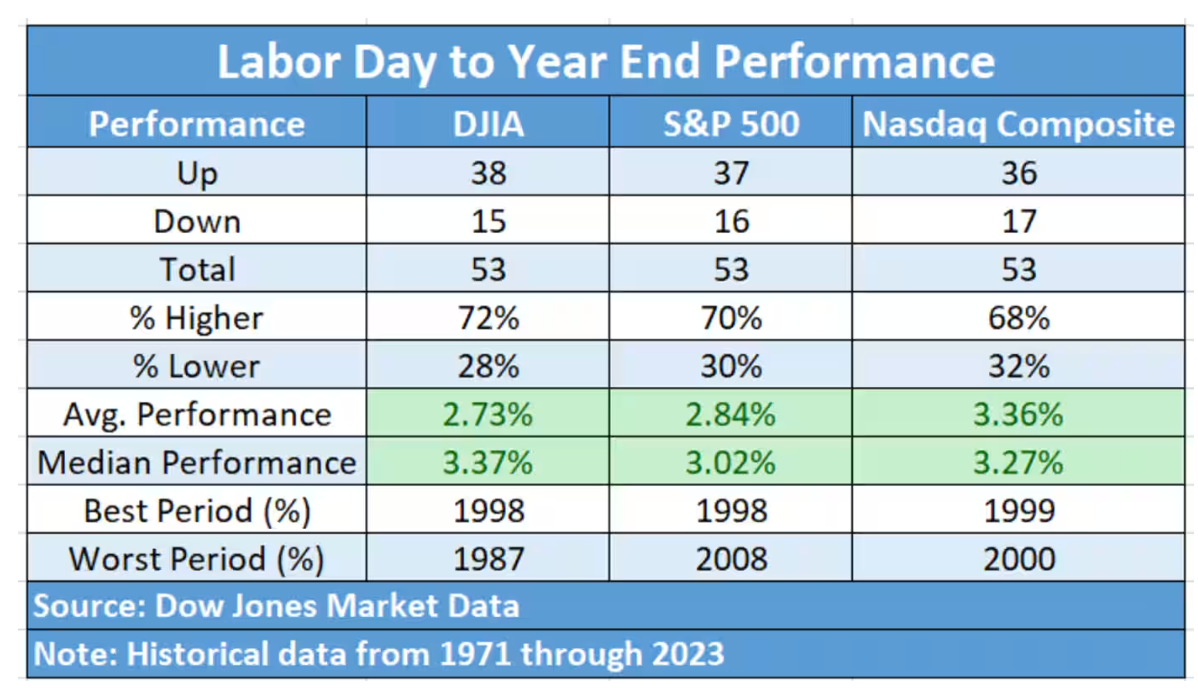September 2025 is here, and markets are already on edge. Traders are watching the Fed hint at a rate cut, retail investors are cooling off after a hot summer, and fund managers are quietly prepping their books for quarter-end. Add all that together, and it’s no surprise the old warning resurfaces: September is the market’s worst month.
It’s a line that gets repeated every year, almost like clockwork. But how much truth is there to the so-called “September Effect?” And more importantly, should investors actually care?
The Numbers Behind the Reputation
Since 1950, September has been the weakest performer of them all. The Dow Jones Industrial Average drifts down about 0.8% on average, while the S&P 500 slips around 0.5%. Go back even further, to 1928, and the S&P has averaged a 1% decline during September. Statistically, it’s the only month that consistently underperforms.
But only about 55% of September are actually negative. That’s barely worse than a coin flip. Depending on which period you examine, September’s performance can look far less sinister and sometimes even stronger than other months.
Why September Feels Cursed Though
Economists and traders have floated a few theories:
- Back-to-School Blues. After the summer slowdown, traders return from vacation and rebalance portfolios, creating extra selling pressure.
- Fund Housekeeping. Many mutual funds wrap up their fiscal year in September. Managers sell losing positions for tax reasons or to clean up books, which can drag markets lower.
- Bond Season. September often brings a wave of new bond issuance, tempting investors to shift money out of equities.
- The Psychology Loop. Perhaps the strongest force of all: investors believe in the“September Effect.” Expecting weakness, they sell and, in doing so, help create the very downturn they feared.
Step back far enough, and the September Effect looks more like a story than a law. It’s less a curse, more a cocktail of seasonal quirks and investor behavior.
Long-term data, including UK stock market records stretching back to the 1700s, show no consistent September slump. In fact, in certain 50-year stretches, September actually outperformed.
Once a market “anomaly” becomes widely known, it tends to lose its edge. The September Effect may have had some truth in earlier decades, but today it’s closer to folklore than predictive insight.
What Investors Should Really Focus On
If you’re trading short-term, the seasonal choppiness in September may be worth watching. But for long-term investors, the lesson is clear: don’t let the calendar dictate your strategy. September Effect, whilst being a matter of fact, has been observed by many investors whilst affecting the market in a reverse manner, as investors now act beforehand.
Market performance is ultimately driven by fundamentals, earnings, interest rates, growth, and policy, not the page of the calendar. And history shows that even after weak Septembers, the final stretch of the year often makes up for it. Roughly 70% of years see markets rise from Labor Day through December.

Some correlation is based on the Election years also. It has to be taken into consideration. This year, the September effect could be amplified. Consumer sentiment in major economies has cooled, and worries about inflation and job security are high. On top of that, the Fed’s anticipated 25-basis-point rate cut adds uncertainty. Lower rates usually support markets, but timing matters. Seasonal selling plus rate anxiety could create extra volatility as human instincts clash with algorithm-driven trading
So while September may carry the reputation of Wall Street’s “bad month,” it’s not a reason to abandon a disciplined plan. For most, it’s just another date on the calendar background noise in the bigger picture of building wealth.

Disclaimer: All materials on this site are for informational purposes only. None of the material should be interpreted as investment advice. Please note that despite the nature of much of the material created and hosted on this website, HODL FM is not a financial reference resource, and the opinions of authors and other contributors are their own and should not be taken as financial advice. If you require advice. HODL FM strongly recommends contacting a qualified industry professional.





